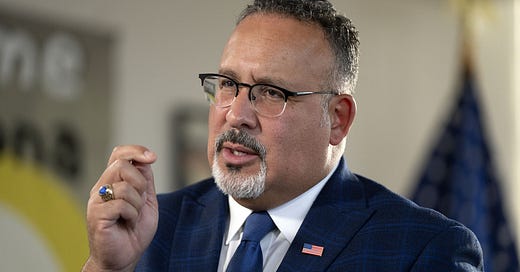Politico: Governors Go on Defense Over Biden Officials' HBCU Land-Grant Funding Claims
From Politico …
Some governors aren’t too happy with the Biden administration's take on funding for land-grant historically Black colleges and universities in their states.
The top officials from both parties are on the defense after Education Secretary Miguel Cardona and Agriculture Secretary Tom Vilsack urged them this week to boost funding for the institutions.
“We know mass standardized letters make for flashy headlines, but the fact is Missouri’s land-grant HBCU, Lincoln University, and all public higher education institutions have seen generational investments under Governor Parson’s Administration,” a spokesperson for Missouri Republican Gov. Mike Parson said in a statement to POLITICO. He added that the university has seen a 63 percent increase in land grant general revenue since the governor took office.
“We’re putting in the work to do better in Missouri. With this letter, we wonder if the federal government is focused on the same or just another distraction from their failed policies."
Key context: An analysis from the Education Department found that inequitable state funding to HBCU land-grant institutions compared to their peer land-grant institutions ranged from $172 million to $2.1 billion in 16 states, including Missouri, Tennessee and Maryland.
“Unacceptable funding inequities have forced many of our nation’s distinguished Historically Black Colleges and Universities to operate with inadequate resources and delay critical investments in everything from campus infrastructure to research and development to student support services,” Cardona said in a statement.
The Second Morrill Act of 1890 required that states, mainly ones a part of the former Confederacy, either show that admission was not restricted by race or establish a separate land-grant institution for Black students to attend. In states that established a land-grant institution for Black students, the law requires that funds are equitably distributed between the two institutions.
What they’re saying: Georgia's Fort Valley State University President Paul Jones, who chairs the Council of 1890s which represents the 19 land-grant HBCUs, applauded the administration for its efforts, saying that states need to step up.
“States are challenged, we understand, trying to meet all of its needs. You have two land-grant institutions within these states,” Jones said in an interview. “I think it’s a matter of ensuring that it’s a priority. In almost all of these situations, states are matching more than one-to-one for the 1862 land grant institutions so I think we have to be seen as a priority. … We’re not competing, we’re actually working together.”
POLITICO contacted the offices of all 16 governors that received a letter from the Biden administration and received responses from six officials at the time of publication of this article.
In Arkansas, a spokesperson for Republican Gov. Sarah Huckabee Sanders said that a “politically charged letter from the Biden administration bureaucrats won’t change her commitment to working with our partners in the legislature.”
Louisiana Gov. John Bel Edwards, a Democrat, said the state is “still trying to figure it out.” The governor said that he’s asked officials at the state level to meet with federal ones.
“They’re saying there’s a $1.1 [billion] underinvestment in Southern [University] relative to [Louisiana State University] over a 30-year period and point to a federal statute that I think dates back to 1890 when land grant universities came into existence,” Edwards said on the radio show "Ask the Governor" on Wednesday. “If a state accepted land grant assistance from the federal government, then there were certain legal requirements, and so we’re trying to figure out whether that was aspirational, whether that was mandatory and so forth.”
In Maryland and Tennessee, both government offices touted the investments that their respective governors — Democrat Wes Moore and Republican Bill Lee — have made for HBCUs.
In North Carolina, Democratic Gov. Roy Cooper’s office recognized the inequities in funding. The state houses the largest HBCU in the country, North Carolina A&T State University, and Cooper plans on responding to the secretaries’ letter, according to his press secretary.
“These institutions are an important part of North Carolina’s history and our future. It is wrong that these institutions have been underfunded since their inception,” Cooper’s press secretary said in a statement to POLITICO.




